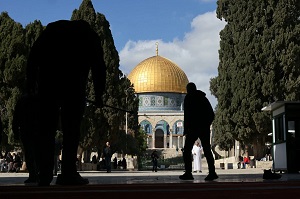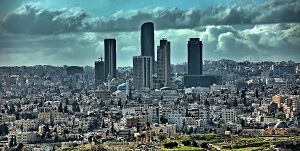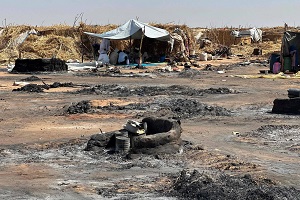Netanyahu ‘doomsday’ coalition looms over Israeli elections - By Ben Lynfield, Jordan News
Wedged between militarism and an expansionist religious nationalism, Israel, in the view of its dwindling peace camp, has clearly failed to become the just society envisioned by some of its founding fathers, at the expense of the Palestinians.
But in the current era in which extremism is increasingly entering the mainstream, especially dark days loom for Israel — and by extension its Arab neighbors.
With last week’s dissolution of parliament, the Knesset, Israel edges toward elections on November 1. It faces the dire possibility of divisive, hard-right Likud party leader Benjamin Netanyahu returning as prime minister at the head of the most right-wing government in Israeli history. During his protracted political career, Netanyahu has not hesitated to incite against Israel’s Arab citizens and to delegitimize Jewish advocates of compromise with the Palestinians.
Setting an alarming tone in advance of Likud’s election campaign, one of Netanyahu’s close associates last month warned Arab students to stop raising Palestinian flags, stressing that this would lead to “another Nakba”. The comments made by Yisrael Katz in the Knesset referred to mass expulsions of Palestinians at Israel’s creation, when more than 700,000 people became refugees.
But it is not just the Likud that is threatening to further radicalize a society that has never recovered its balance since Yitzhak Rabin was assassinated by a right-wing extremist in 1995.
Netanyahu would bring with him incendiary anti-Arab extremists into the corridors of power as coalition partners. This would replace the hodgepodge right-center-left coalition that over the last year intensified the occupation in the West Bank even as, with the inclusion of an Arab party in the government, it introduced a somewhat calmer tone into domestic discourse.
Netanyahu is seen as particularly dangerous since he is liable to indulge in any policy no matter how immoral or damaging in order to stay in power and avoid being jailed for alleged corruption scandals.
The Netanyahu doomsday development could still be averted by a victory for the caretaker prime minister, Yair Lapid, a centrist with relatively moderate pronouncements who in theory supports the emergence of a Palestinian state and as foreign minister sought to deepen ties with Arab countries.
One of the extremists who could play the role of kingmaker for Netanyahu is Itamar Ben-Gvir, a legislator who proposes building a synagogue in the esplanade housing Islam’s third holiest shrine, Al-Aqsa Mosque in Jerusalem. The area is also revered by Jews as the site of biblical temples.
Over the last year, Ben-Gvir’s provocative acts in Jerusalem included supporting the expulsions of Palestinians in the Sheikh Jarrah neighborhood and promoting Jewish prayer in the mosque compound. This has kindled tensions regionally, especially in Jordan. Ben Gvir describes the Jordanian-appointed officials who oversee the mosque as “terrorists”.
After the election, there is no reason Ben Gvir should not become a minister since he shares core Likud principles, key Netanyahu ally Miki Zohar said last week.
Then there is Bezalel Smotrich, who has a history of statements implying a desire to carry out genocide against Arabs. In 2017, he unveiled a plan that said if Arabs do not leave the occupied territories or accept second class status Israeli Forces “will know what to do”.
American-Israeli political scientist and pollster Dahlia Scheindlin says Smotrich’s statements must not be overlooked.
“Israel will not do this. But it places a burden on relations with the Arab world and Arab citizens. Such a government would not hold back on spouting hateful things against the Palestinians every day and saying Arabs are all terrorists.”
At regional level, such a poisonous atmosphere “would mean a souring — not breaking — of ties with the UAE, not a backing off from the Abraham Accords but a cold peace. Saudi Arabia would be less likely to normalize relations,” Scheindlin says.
Netanyahu is seen as particularly dangerous since he is liable to indulge in any policy no matter how immoral or damaging in order to stay in power and avoid being jailed for alleged corruption scandals.
Setting an alarming tone in advance of Likud’s election campaign, one of Netanyahu’s close associates last month warned Arab students to stop raising Palestinian flags, stressing that this would lead to 'another Nakba'.
Daniel Seidemann, director of the NGO Terrestrial Jerusalem, which supports the establishment of a Palestinian state alongside Israel, has a bleak vision that a Netanyahu-led government could engage in large-scale displacement of Palestinians in the occupied West Bank. This, he believes, would go well beyond the current alarming actions by the military to coerce 1,200 Palestinian men, women, and children in the Masafer Yatta region to leave their villages to enable intensified use of a military firing zone.
Although it is too early to predict what will happen, a Netanyahu triumph is a distinct possibility. A recent poll by the Maariv newspaper indicated that if Ayelet Shaked, the hard-right former interior minister, threw her weight behind Netanyahu, he would return to power.
Thabet Abu Rass, co-executive director of the Abraham Initiatives NGO that promotes coexistence, views that as a disaster in the making.
He recalled that during the late 1970s, then Likud prime minister Menachem Begin treated the unabashedly racist lawmaker Meir Kahane as a pariah. Begin led a walkout of the Knesset chamber whenever Kahane, who advocated the expulsion of Arabs from Israel, rose to the podium.
“Now the children of Kahane will be in the coalition. This is very dangerous for Israeli society,” Abu Rass said.
Ben Lynfield is the former Middle East affairs correspondent at the Jerusalem Post. ©Syndication Bureau.
Latest News
-
 Israeli defence ministry announces 'preventive strike' on Iran
Israeli defence ministry announces 'preventive strike' on Iran
-
 Israel aims to bring 'permanent demographic change' to West Bank, Gaza — UN
Israel aims to bring 'permanent demographic change' to West Bank, Gaza — UN
-
 US-Iran Talks End with No Deal but Potential Signs of Progress
US-Iran Talks End with No Deal but Potential Signs of Progress
-
 Cold conditions forecast to prevail in Kingdom until Sunday — JMD
Cold conditions forecast to prevail in Kingdom until Sunday — JMD
-
 Civilian death toll in Sudan war more than doubled in 2025, UN says
Civilian death toll in Sudan war more than doubled in 2025, UN says